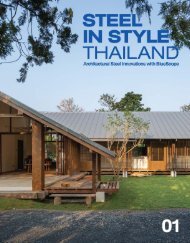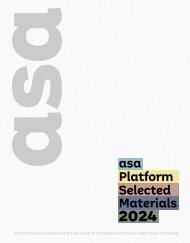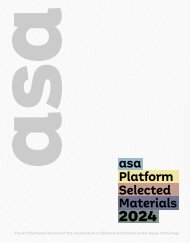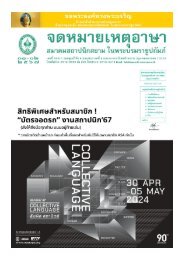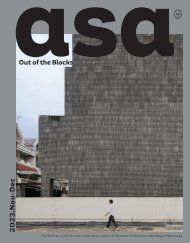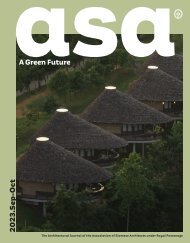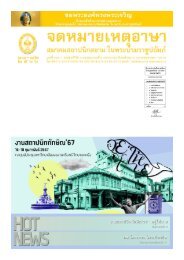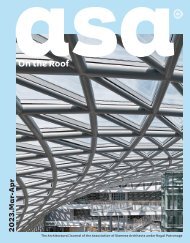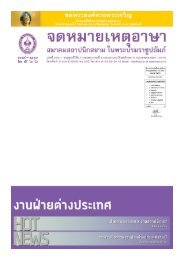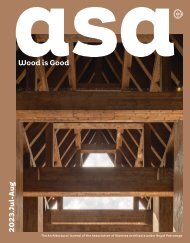บ้านเรือนถิ่นไทยในช่วงเจ็ดทศวรรษ 2489-2559
Create successful ePaper yourself
Turn your PDF publications into a flip-book with our unique Google optimized e-Paper software.
“เนื้อหอมแห่งเดือน” จากนักค้าหุ้นทั่วโลก มีการโยก<br />
เงินมาลงทุนอย่างมากมาย ทำให้เกิดการเจริญเติบโต<br />
อย่างมหาศาลในตลาดหุ้น โดยเริ่มต้นเมื่อ พ.ศ. 2531<br />
ตลาดอสังหาริมทรัพย์นั้นร้อนแรงเป็นอย่างมาก ทำให้<br />
เกิดการก่อสร้างอย่างมหาศาลและทำให้ราคาที่ดินนั้น<br />
สูงขึ้นเป็นเงาตามตัว<br />
อย่างไรก็ดีแม้จะมีบรรยากาศที่เอื้อต่อการเจริญ<br />
เติบโตอย่างมากมาย ประเทศไทยในยุคนั้นก็ได้สร้าง<br />
บทเรียนให้เห็นถึงผลกระทบของการเจริญเติบโตที่<br />
รวดเร็วเกินไป<br />
จากการเจริญเติบโตอย่างรวดเร็วของตลาดค้าหลัก<br />
ทรัพย์ในประเทศไทยและตลาดอสังหาริมทรัพย์ก่อให้<br />
เกิดผู้ประกอบการใหม่ๆ ที่มีความสามารถเข้ามาเล่น<br />
การเปลี่ยนแปลงที่ดูดีในครั้งนี้กลับกลายเป็นภาระ<br />
เพราะมันชัดเจนมากที่ประเทศไทยนั้นได้เปรียบในเรื่อง<br />
ของการผลิตที่ใช้แรงงานเป็นหลักในช่วงส่งออกบูม ซึ่ง<br />
กิจกรรมเหล่านี้ก็ไม่สามารถคาดเดาได้ว่าจะอยู่ได้ยั่งยืน<br />
เพียงใด ค่าแรงขั้นต่ำภายในประเทศนั้นเพิ่มขึ้นเรื่อยๆ<br />
ในระยะแรก และพุ่งสูงขึ้นอย่างรวดเร็วในช่วยท้ายของ<br />
คริสต์ทศวรรษ 1980 (พ.ศ. 2523 - 2532) เนื่องจาก<br />
ประเทศกำลังพัฒนาอื่นๆ ก็ปรับใช้กลยุทธสร้างฐานการ<br />
privatization of the public services has a great deal to<br />
recommend it, the contractual arrangements that underlay<br />
these concessions required considerable sophistication<br />
and integrity among the negotiators. The negotiation<br />
process in turn had to be fair and the results transparent<br />
to the public. None of these conditions was met. The<br />
implementation of these concessions seems to have<br />
combined the delays, inefficiencies and political<br />
interference of the public enterprises with the greed of the<br />
private sector. The consequence can be seen in the<br />
notoriously chaotic traffic of Bangkok, for which no solution<br />
appears to be in sight.<br />
The “good times” came to an end with the Iraqi invasion<br />
of Kuwait in August 1990, and with the coup d’etat by the<br />
army against the elected prime minister, General Chatichai<br />
Choonhavan in February 1991. The speculative bubble<br />
burst, but fortunately, the rest of the economy had a soft<br />
landing, and growth in production continued albeit at the<br />
more moderate pace of 7 to 8 per cent per cent, again<br />
with the industrial sector leading the way.<br />
ผลิตเพื่อส่งออกเพื่อมาเป็นคู่แข่งกับประเทศไทย<br />
มันเป็นแค่เงื่อนไขของเวลาเท่านั้นที่ประเทศที่มีค่าแรง<br />
ขั้นต่ำที่มีราคาถูกกว่าประเทศไทยจะเข้ามาฉกชิง<br />
ส่วนแบ่งตลาดส่งออกของประเทศไทย อนาคตของ<br />
ประเทศไทยขึ้นอยู่กับความสามารถในการพัฒนาเพิ่ม<br />
ขีดความสามารถทางเทคโนโลยีอย่างต่อเนื่อง และ<br />
ทักษะที่มีอยู่ของวิสาหกิจ และคุณภาพฝีมือแรงงาน<br />
ระบบที่ให้รางวัลกับทักษะที่ดูคลุมเครือนั้นไม่ใช่ค ำตอบ<br />
ประเทศไทยเคยและมีโอกาสที่ดีในการดึงดูดนัก<br />
ลงทุนต่างชาติ พวกเขาเหล่านั้นมีบทบาทสำคัญใน<br />
กลยุทธ์ขยายทักษะทางด้านเทคโนโลยีโดยเฉพาะการ<br />
ฝึกหัดพนักงาน แต่ถ้าจะพึ่งแต่ต่างชาติเพียงอย่างเดียว<br />
คงไม่ใช่คำตอบทั้งหมดของอนาคตของประเทศชาติ<br />
ในระยะแรกของการเติบโตของประเทศในยุคนั้นเรา<br />
ใช้ทุนสำรองที่พอจะมีเหลืออยู่บ้าง แต่ก็ใกล้หมดเต็มที<br />
เพราะประเทศเพิ่งผ่านจากวิกฤตเศรษฐกิจเมื่อช่วง<br />
คริสต์ทศวรรษ 1980 (พ.ศ. 2523 - 2532) อาการตึงตัว<br />
อย่างรุนแรงเกิดขึ้นให้เห็นโดยทั่วไปในระบบโครงสร้าง<br />
พื้นฐานของประเทศ โดยเฉพาะภาคการขนส่งและภาค<br />
การสื่อสาร จุดนี้เป็นจุดที่รัฐบาลตัดสินใจผิดพลาดอย่าง<br />
รุนแรงด้วยการแปรรูปองค์กรรัฐวิสาหกิจที่ให้บริการขั้น<br />
Industry in Thailand has traditionally been concentrated<br />
in Bangkok and its environs. The government has made<br />
many attempts to reduce the concentration of economic<br />
activities in Bangkok, the two main instruments deployed<br />
being the spread of infrastructural services to the countryside,<br />
and differential tax treatment through the BOI privileges.<br />
The spread of the physical infrastructure has been a<br />
long process. The road network was built up in the 1960s<br />
and the early 1970s. During the 1980s, electricity was<br />
made available to nearly all villages in Thailand. What still<br />
needs to be done is to make the telephone system also<br />
available in the rural areas, but then Bangkok itself still<br />
suffers from a shortage of lines.<br />
The BOI’s generous tax privileges to investors who<br />
located their plants in the outer provinces had been of<br />
long standing. In their way, they have been effective<br />
particularly during the last few years. Unfortunately, BOI<br />
has had a habit of defining Bangkok and its environs (the<br />
area to be discriminated against) quite narrowly, and then<br />
gradually widening it. Firms would locate their plants just<br />
87





